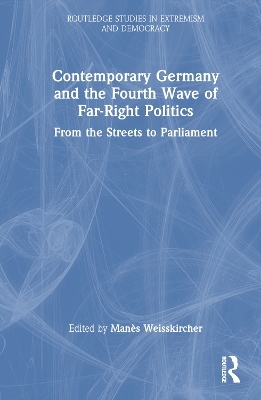
Contemporary Germany and the Fourth Wave of Far-Right Politics
Routledge (Verlag)
978-0-367-63408-7 (ISBN)
For a long time, Germany was regarded as an exceptional case because of the lack of an established far-right party on the national level. Times have changed – but Germany still remains unique. The book highlights four features that continue to make the case exceptional within Western Europe: (I) The strong diversity of vibrant far-right political players in Germany and their many interconnections, (II) the electoral success of AfD, i.e. the delayed electoral breakthrough of a far-right party on the national level, (III) the importance of ‘militant democracy’, specifically how established players have responded to AfD, and (IV) the relevance of the east-west divide for understanding far-right politics in Germany. Contributions on these topics highlight the broader theoretical relevance of the analysis of the German far-right, connecting to many research questions that have occupied scholars also in other contexts.
The book is essential reading for all those with an interest in the far right, German and European politics, as well as in the interconnections between political parties, social movements, and subcultural milieus.
Manès Weisskircher leads a research group on far-right politics and climate action (REXKLIMA) at the Institute of Political Science, TU Dresden, and is affiliated to the Center for Research on Extremism (C-REX), University of Oslo, and the Center for Civil Society Research, Berlin Social Science Center (WZB). His research interests are social movements, political parties, democracy, and the far right.
Introduction: German Exceptionalism during the Fourth Wave of Far-right Politics Part I The Far Right Outside of Legislatures 1. Germany’s New Right: Between Neo-National Socialism and Liberal Democracy 2. Germany’s Anti-Islamic PEGIDA Movement: A Local Phenomenon and Its Broader Impact 3. Interconnected Realities: The Hybrid Dynamics of Far-right Online and Offline Mobilization 4. Fitting in, Standing out: Far-right Youth Style and Commercialization in Germany 5. The Violence of the Far Right: The Three Decades after German Reunification Part II The Electoral Breakthrough of the AfD 6. The Politicization of Immigration and Radical Right Party Politics in Germany 7. The Electoral Breakthrough of the AfD and the East-west Divide in German Politics 8. Far-right Parties and Divisions over Movement-party Strategy: The AfD and the anti-Corona Protests of Querdenken 9. The Power of Anti-Pacting in Germany: History and Outlook 10. Learning how to Respond to the AfD. Uploading from the Subnational to the National Level? 11. The AfD’s Influence on Germany’s Coalition Landscape. Obstacle or Opportunity for the Center-right? Conclusion: Towards a Fifth Wave of Far-Right Politics in Germany and beyond?
| Erscheinungsdatum | 03.10.2023 |
|---|---|
| Reihe/Serie | Routledge Studies in Extremism and Democracy |
| Zusatzinfo | 18 Tables, black and white; 20 Line drawings, black and white; 1 Halftones, black and white; 21 Illustrations, black and white |
| Verlagsort | London |
| Sprache | englisch |
| Maße | 156 x 234 mm |
| Gewicht | 500 g |
| Themenwelt | Geisteswissenschaften ► Philosophie |
| Sozialwissenschaften ► Politik / Verwaltung ► Politische Systeme | |
| Sozialwissenschaften ► Politik / Verwaltung ► Politische Theorie | |
| Sozialwissenschaften ► Politik / Verwaltung ► Staat / Verwaltung | |
| ISBN-10 | 0-367-63408-2 / 0367634082 |
| ISBN-13 | 978-0-367-63408-7 / 9780367634087 |
| Zustand | Neuware |
| Informationen gemäß Produktsicherheitsverordnung (GPSR) | |
| Haben Sie eine Frage zum Produkt? |
aus dem Bereich


